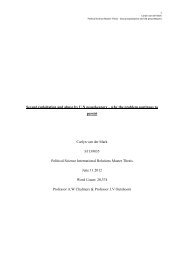The Impact of Armed Conflict on Women and Girls - UNFPA
The Impact of Armed Conflict on Women and Girls - UNFPA
The Impact of Armed Conflict on Women and Girls - UNFPA
Create successful ePaper yourself
Turn your PDF publications into a flip-book with our unique Google optimized e-Paper software.
decide to return to their husb<strong>and</strong>’s pre-c<strong>on</strong>flict place <str<strong>on</strong>g>of</str<strong>on</strong>g> residence, or their<br />
own; <strong>and</strong><br />
• Communities are also affected by urbanizati<strong>on</strong> trends. Masses <str<strong>on</strong>g>of</str<strong>on</strong>g> people<br />
from rural areas, mostly women, moved to urban centres for multiple reas<strong>on</strong>s,<br />
such as fleeing c<strong>on</strong>flict areas for safer envir<strong>on</strong>ments or seeking better job<br />
opportunities. As a result, communities are faced with rising prejudices<br />
between local people <strong>and</strong> newcomers. Urban residents tend to regard rural<br />
people as sec<strong>on</strong>d-class citizens, while older rural women c<strong>on</strong>sider urban<br />
culture as threatening to their guarded cultural identities <strong>and</strong> values, making<br />
integrati<strong>on</strong> into urban surroundings more difficult.<br />
Health<br />
<str<strong>on</strong>g>Armed</str<strong>on</strong>g> c<strong>on</strong>flicts have extremely serious effects <strong>on</strong> health sectors, as basic<br />
infrastructures are destroyed. Hospitals, clinics <strong>and</strong> local health centres are<br />
demolished while medicines, equipment <strong>and</strong> supplies are looted. Electricity <strong>and</strong><br />
water plants are damaged <strong>and</strong> health informati<strong>on</strong> systems break down.<br />
C<strong>on</strong>sequently, the capacity <str<strong>on</strong>g>of</str<strong>on</strong>g> the health system to cope with war emergencies is<br />
crippled. Furthermore, the number <str<strong>on</strong>g>of</str<strong>on</strong>g> medical staff decreases due to deaths,<br />
displacement, injuries or flight to other countries. Numerous doctors <strong>and</strong> nurses<br />
are channelled towards the c<strong>on</strong>flict z<strong>on</strong>es to cater to the military forces, while<br />
remaining health workers are demoralized <strong>and</strong> left without adequate support or<br />
payment. L<strong>and</strong> mines <strong>and</strong> curfews also limit the mobility <str<strong>on</strong>g>of</str<strong>on</strong>g> health workers to<br />
meet the community needs. Another important factor that affects the health<br />
sector is the transfer <str<strong>on</strong>g>of</str<strong>on</strong>g> public funds from health to defence. This results in<br />
declines in the quality <str<strong>on</strong>g>of</str<strong>on</strong>g> care, lowered st<strong>and</strong>ards in HIV testing for blood<br />
transfusi<strong>on</strong>s <strong>and</strong> the disrupti<strong>on</strong> <str<strong>on</strong>g>of</str<strong>on</strong>g> health programmes. This gap can be covered<br />
by unregulated private-sector health care which, in turn, increases costs to their<br />
users.<br />
<str<strong>on</strong>g>The</str<strong>on</strong>g> breakdown <str<strong>on</strong>g>of</str<strong>on</strong>g> the health sector <strong>and</strong> the shift to the private sector<br />
providing health-care services exacerbates the health <str<strong>on</strong>g>of</str<strong>on</strong>g> populati<strong>on</strong>s in c<strong>on</strong>flict<br />
areas. Decreased income <strong>and</strong> increased cost <str<strong>on</strong>g>of</str<strong>on</strong>g> services are prohibitive factors<br />
for adequate health-care access, especially for women, large families <strong>and</strong> rural<br />
populati<strong>on</strong>.<br />
Displaced pers<strong>on</strong>s, refugees <strong>and</strong> people living in camps face major<br />
difficulties related to inadequate accommodati<strong>on</strong>, poor sanitati<strong>on</strong> c<strong>on</strong>diti<strong>on</strong>s,<br />
shortages <str<strong>on</strong>g>of</str<strong>on</strong>g> m<strong>on</strong>ey <strong>and</strong> humanitarian aid, lost documents, poor health-care<br />
provisi<strong>on</strong>s <strong>and</strong> many psychological problems. As a result, malnutriti<strong>on</strong>, anaemia,<br />
malaria, dysentery, tuberculosis <strong>and</strong> other diseases worsen their already<br />
precarious situati<strong>on</strong>. Refugee women are c<strong>on</strong>sidered the most vulnerable group,<br />
since they are <str<strong>on</strong>g>of</str<strong>on</strong>g>ten exposed to violence, sexual abuse, rape <strong>and</strong> enforced<br />
pregnancy, which require additi<strong>on</strong>al specialized care <strong>and</strong> psychological support.<br />
105




![IANSA [PDF, 2MB] - PeaceWomen](https://img.yumpu.com/25206379/1/190x123/iansa-pdf-2mb-peacewomen.jpg?quality=85)
![Commitments Sample [PDF, 93KB] - PeaceWomen](https://img.yumpu.com/25206331/1/190x245/commitments-sample-pdf-93kb-peacewomen.jpg?quality=85)










![A Toolkit for Advocacy and Action [PDF, 260KB] - Peace Women](https://img.yumpu.com/25205989/1/190x245/a-toolkit-for-advocacy-and-action-pdf-260kb-peace-women.jpg?quality=85)